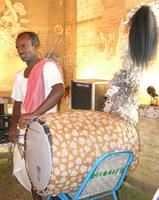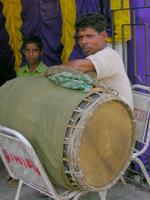
A rattle of drumbeats and one drum in orbit round the neck of a dhaaki who does an exuberant twirling leap. Just because he can.
Where have all the dhaakis gone? As little as five years ago, when I came back to Calcutta, I saw a procession of dhaakis the day before Mohaloy, a sort of mobile employment exchange parading before the assembled Pujo Committees. This year the first dhaak I heard was over at Shinghi Park on Panchami morning. And of all things, dhaak as piped music in a restaurant on Shoshthi. (Shoshthi’r diney hoshthi! Is that expression still au courant?)
a procession of dhaakis the day before Mohaloy, a sort of mobile employment exchange parading before the assembled Pujo Committees. This year the first dhaak I heard was over at Shinghi Park on Panchami morning. And of all things, dhaak as piped music in a restaurant on Shoshthi. (Shoshthi’r diney hoshthi! Is that expression still au courant?)
 I love this particular restaurant, not just because three of us polished off eleven, we counted, eleven pieces of ilish (and golda chingri and chhana’r dalna by the bucketful) on the buffet but also because they followed up the dhaak with the double-CD of Kishore Kumar’s Robindroshongeet. Music arranged by Hemonto Mukhopadhyay (known to the rest of India as Hemant Kumar, singer-composer for films like Jaal and Khamoshi), Kishore trained by Subinoy Ghosh, producing one of the best reflections of Bangali tradition that you can hope to come across. For those who sneer at the idea, a reminder – Satyajit Ray didn’t choose anybody from the Dokkhini tradition when he wanted Robindroshongeet in his films. And a challenge – show me one bar, dammit show me one note in one song where the Boss has not been true to the Shworobitaan.
I love this particular restaurant, not just because three of us polished off eleven, we counted, eleven pieces of ilish (and golda chingri and chhana’r dalna by the bucketful) on the buffet but also because they followed up the dhaak with the double-CD of Kishore Kumar’s Robindroshongeet. Music arranged by Hemonto Mukhopadhyay (known to the rest of India as Hemant Kumar, singer-composer for films like Jaal and Khamoshi), Kishore trained by Subinoy Ghosh, producing one of the best reflections of Bangali tradition that you can hope to come across. For those who sneer at the idea, a reminder – Satyajit Ray didn’t choose anybody from the Dokkhini tradition when he wanted Robindroshongeet in his films. And a challenge – show me one bar, dammit show me one note in one song where the Boss has not been true to the Shworobitaan.
Aamaar raat pohalo sharodo praatey. Aami tomaaey joto shuniyechhilem gaan (I haven’t heard this one recorded by anybody else). Ey din aaji kone ghorey go ... Which was the perfect note on which to exit.
Pujo now is also an unspoken war between the high and the low culture. Where earlier we had Nazia Hassan with Aap jaisa koi and Usha Uthup’s rich black velvet voice in Hari Om hari (an Eurhythmics ..err… ‘cover’), now we have shehnai. And I don’t know about you, but shehnai music all day depresses me from one end of my spine to the other.
What a contrast, really. From the late ’60s to the early ’80s, R.D. Burman road-tested all his tunes in his Bangla Pujo albums. At his best he gave us magic – Asha Bhonsle with Shondhya belaye, Moyna bolo tumi Krishno Radhey, Phool-ey gondho nei. Kishore Kumar’s Pujo releases included Noyono shoroshi keno, Ei je nodi and (a particularly mushy Pujo when I was 14) Aamaar dweep nebhano raatey. Lata Mangeshkar, Manna Dey, R.D. himself, all their voices are woven into my fabric of Pujo memories.
tunes in his Bangla Pujo albums. At his best he gave us magic – Asha Bhonsle with Shondhya belaye, Moyna bolo tumi Krishno Radhey, Phool-ey gondho nei. Kishore Kumar’s Pujo releases included Noyono shoroshi keno, Ei je nodi and (a particularly mushy Pujo when I was 14) Aamaar dweep nebhano raatey. Lata Mangeshkar, Manna Dey, R.D. himself, all their voices are woven into my fabric of Pujo memories.
And what do we have today? Mostly barbaric remixes (painting the lily and gilding refined gold, good remixes are so very rare) or pretentious (and sub-standard) shehnai. Sad, because for all the oposhonskriti (‘bad culture’?), the loudspeakers at the Pujo mandaps provided our measure of which songs were hits each year. 1977 to ’81 was a particularly rich period – or do I just remember it better?
Oh well, we also have recorded dhaak tracks. I first heard them that Pujo when I was in exile in the ‘armpit of the United States’ and I’ve been grateful ever since. Baajiye jaao!
************************************************************************

4 comments:
I love Oh Calcutta too. Ilish... My mouth's already watering.
You're on the wrong track, P'Nickel. Oh Calcutta! is great, but they don't serve ilish on the buffet.
This was the Stadel over in Salt Lake, and the cooking was Anatolean. (*sigh* I shall ALWAYS be fat)
J.A.P.
Aamaar raat pohalo sharodo praatey...my all-time favorite rendition of the same must be by Pankaj Mullick. I am old-school, what can I say. It appears on an album of the same name, all Guruji's songs sung by another guru.
And keep up the pics. I especially liked the Great Pumpkin and the last one.
Krishna
Pankaj Mullick - ki darun! I love his rendition of "Emono raatey taare bola jai" (haven't heard anyone sing this) and "Amaar bhanga pother ranga dhulaai". Oh Pankaj Mullick is just so sublime. And yet, his magic loses all his lustre in Hindi, some people are just meant to sing in one language.
Thanks JAPda for reaffirming my joy in Kishore Kumar's rendition of Robi Thakurer gaan.
Post a Comment